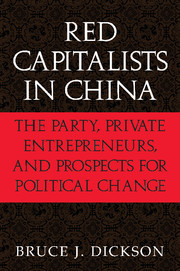Book contents
- Frontmatter
- Contents
- List of Tables
- Acknowledgments
- 1 Introduction
- 2 Challenges of Party Building in the Reform Era
- 3 New Institutional Links
- Appendix: Survey Design and Implementation
- 4 The Politics of Co-optation
- 5 The Political Beliefs and Behaviors of China's Red Capitalists
- Appendix: Multivariate Analyses of Political Beliefs of Officials and Entrepreneurs
- 6 Conclusion
- Bibliography
- Index
2 - Challenges of Party Building in the Reform Era
Published online by Cambridge University Press: 29 August 2009
- Frontmatter
- Contents
- List of Tables
- Acknowledgments
- 1 Introduction
- 2 Challenges of Party Building in the Reform Era
- 3 New Institutional Links
- Appendix: Survey Design and Implementation
- 4 The Politics of Co-optation
- 5 The Political Beliefs and Behaviors of China's Red Capitalists
- Appendix: Multivariate Analyses of Political Beliefs of Officials and Entrepreneurs
- 6 Conclusion
- Bibliography
- Index
Summary
Traditionally, party building has been linked to the party's historical tasks and to the theories and lines established by the party in order to accomplish the tasks … [We] must firmly establish the guiding idea that party building serves the implementation of the basic line and put an end to the practice of tackling party building for the sake of party building in isolation from the center of economic construction. We must make the implementation of the basic line the be all and end all in party building and let it permeate all parts of party building, all manner of work in party building.
THE CCP has been highly selective about the kinds of people it recruits, although the criteria for membership has changed over time. The qualities of the party's key personnel and rank-and-file membership as well as the integrity of the party's organization have been key elements of elite strategies for successful policy implementation, regardless of the content of their policy agenda. As is the case for most complex organizations, the criteria for membership has changed along with the party's main goals. For example, different types of skills were needed during the Great Leap Forward than are sought today when the party is pursuing “reform and opening” (gaige kaifang) policies. Mass mobilization and propaganda skills are appropriate for one set of policy goals, but technical expertise and entrepreneurship are necessary for others.
- Type
- Chapter
- Information
- Red Capitalists in ChinaThe Party, Private Entrepreneurs, and Prospects for Political Change, pp. 29 - 55Publisher: Cambridge University PressPrint publication year: 2003

